![]()
Fri, May 20, 2011 | Rubin Reports | By Barry Rubin
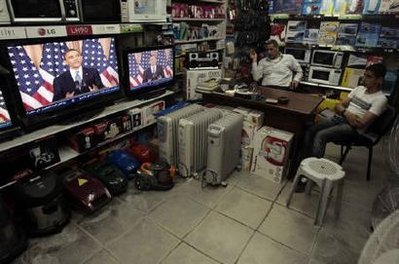
Palestinians watch a television broadcast of a speech by U.S. President Barack Obama in U.S., at a shop in Gaza City May 19, 2011. (REUTERS/Ismail Zaydah)
Obama’s Middle East Speech: The Opposite of Strategy Is Catastrophe
President Barack Obama’s big Middle East speech is extraordinarily important. I think that it has been largely misinterpreted and deserves a very detailed examination. Forgive me then for analyzing it at length but that’s necessary to understand both Obama’s thinking and policy.
First and foremost, this could be called Obama’s George Bush speech. The intention was to find some way to make the main priority of U.S. policy the support of democracy in the Arab world. This is precisely the theme that Obama’s supporters ridiculed when Bush did it. So Obama had to find some way to approach the issue without anyone realizing he had copied Bush. He succeeded! No one seems to have caught on yet.
One of the tricks is that he began by saying that he was opening “a new chapter in American diplomacy.” But in his main theme he wasn’t doing that at all. He said, “The United States supports a set of universal rights.” Isn’t this in a real sense the exact opposite of multiculturalism? Doesn’t it contradict everything Obama and his supporters have stood for up to now?
Bush, whatever his failings, combined a policy of supporting democracy with one of fighting revolutionary Islamism. If Obama only supports revolutionary change and goes soft on America’s enemies, his policy will promote revolutionary Islamism.
Obama claimed, “Now, already, we’ve done much to shift our foreign policy following a decade defined by two costly conflicts.” In other words, Bush is to be identified with the wars in Iraq and Afghanistan; Obama is to be identified with ending those wars successfully and promoting democracy.
Second, this was not a speech about Israel-Palestinian issues. On the contrary, he was trying to find a framework for pushing that question onto a backburner. Here he failed completely. Since Obama has such low credibility with Israel and its supporters, some relatively band statements blew up into such a huge crisis that some are describing it as the end of the traditional U.S.-Israel alliance.
The main problem with Obama’s speech is not what he said about Israel but what he said about developments in the Arab world.
Basically, the difficulty is that he embraced change in the Arab world with no strategic sense whatsoever and not even a gesture toward the dangers involved. Obama wanted to put himself on the side of the “Facebook kids.” It is an approach that has nothing in common with a serious approach to foreign policy.
Everything about the upheavals is good according to Obama. He has zero comprehension of the revolutionary Islamist threat. For Obama there is only al-Qaida (bad); the existing regimes (bad) and those who want freedom and democracy (good). There is no mention of the Muslim Brotherhood. There is no mention of Hizballah.
“Two leaders have stepped aside. More may follow.” Here he refers to Egypt and Tunisia. Who are the more who might follow? Obviously, Libya is implied here and also Yemen. Yet these eight words contain much of the huge flaw in Obama’s policy.
On one hand, no U.S. ally is given an exemption. There is nothing in the speech to indicate that Obama does not favor the overthrow of the governments of Saudi Arabia, Jordan, Bahrain, Oman, Kuwait, the United Arab Emirates, Qatar, Morocco, or Algeria. Have no doubt: These governments will see this speech as favoring their demise.
On the other hand, there is no special emphasis on the overthrow of America’s enemies. There is no explicit call for the overthrow of the Iranian and Syrian governments, nor of Hamas in Gaza, now keeping Hizballah out of power in Lebanon, nor the mass-murdering regime in Sudan.
It might be noble and consistent for Obama to say, “If America is to be credible, we must acknowledge that at times our friends in the region have not all reacted to the demands for consistent change — with change that’s consistent with the principles that I’ve outlined today.” But what that means is, for example, that friends will be treated the same way as enemies.
This is one more example of the upside down, non-strategic, absent of all concept of national interest that characterizes Obama’s policy. President Obama is no foreign policy Realist.
Obama stresses that al-Qaida is faltering. True. But other Islamists are advancing. I won’t list all the examples here but there are a dozen of which Obama never seems to take notice: Muslim Brotherhood gains in Egypt; Hizballah on the verge of power in Lebanon; Hamas ruling the Gaza Strip; Turkey joining the enemy camp; Iran still going full-speed ahead toward nuclear weapons.
Iran and nuclear weapons? There are three mentions but what is one of the most important factors in the region barely registers. One of those is to say that having nuclear weapons doesn’t benefit anyone. That should be a laugh line.
As I’ve said before, a basic concept of this administration is that al-Qaida is the enemy because it attacks America. Yet the much larger strategic threat posed by revolutionary Islamism — Iran, Syria, Hamas, Hizballah, the Muslim Brotherhood, smaller groups, and with Turkish government cooperation — is not perceived as a threat.
That is a catastrophe.
Most of the speech is a celebration of the revolutionary upheavals as if they were the American civil rights’ movement (he mentions Rosa Parks) or indeed the American Revolution.
What he wants to do is an extension of his view on domestic politics: get on the side of the people, encourage rebellion, and everything will work out all right.
And here is all he says about the threat to that rosy picture:
“Not every country will follow our particular form of representative democracy, and there will be times when our short-term interests don’t align perfectly with our long-term vision for the region. But we can, and we will, speak out for a set of core principles –- principles that have guided our response to the events over the past six months.”
Really? What did Obama say about 2011 that might not be said about Iran in 1978? Or before the Palestinian elections that brought Hamas to power?
After the leading candidate for the presidency of Egypt predicted an Islamist majority in parliament can the president of the United States not have that disaster on his mind? Notice how he says “short-term interests.” But why can’t countries follow a path totally opposite to a Western concept of democracy, an Islamist dictatorship?
And why can’t the results be the opposite of “align perfectly” and be totally in opposition to U.S. interests? Why can’t the results be catastrophic for U.S. long-term interests, as the revolution in Iran was?
There were gestures toward women’s rights and a sentence on Christians. But notice how these are just put in to cover the administration. The Christians of Egypt are mentioned but not those suffering far more in Iraq. The problem must be portrayed as narrow not symptomatic of a much wider intolerance and extremism.
What could Obama have easily said? Something like this:
We favor forces of stability and democracy but recognize that there are powerful forces that want to divert these revolutions into the creation of new, anti-Western dictatorships that will add more decades of suffering and bloodshed to the region. We stand with the moderates and oppose those radical forces, recognizing the dangers of the current moment. Past revolutions have shown how things can go wrong and we are aware of this possibility.
We also recognize that in countries like Iran, Syria, and Libya, and also in the Gaza Strip, that there are especially brutal dictatorships incapable of reform and dangerous to regional peace and our interests. We will oppose those governments and favor their departure from the scene.
But there is no hint that such ideas have entered Obama’s mind or those of the advisors to whom he’s listening.
Finally what does Obama propose as his great policy for implementing his ideas?
Answer: He’s going to send money. But in foreign policy as on domestic issues this is not a solution. Consider all the aid the United States gave to Egypt or the Palestinians. What political advances did that bring?
And all the money won’t be enough. Food prices are rising. Egypt will continue to be anarchic. A democratic state will suffer a bigger crisis than a dictatorship under such conditions.
So that’s it. Obama’s policy is to cheer the revolutionaries, boo the dictators, and send money.
That is not a strategy, it’s a formula for catastrophe and the destruction of U.S. allies and interests in the region. Moreover, when anti-American radicals — the Brotherhood, other revolutionary Islamists, radical nationalists, and far-left parties — dominate Egypt’s parliamentary elections in September (an outcome that is 100 percent predictable) this Obama policy will collapse overnight.
I’ll write about the aspects dealing with Israel and the “peace process” separately.
About the author,
Barry Rubin is director of the Global Research in International Affairs (GLORIA) Center, editor of the Middle East Review of International Affairs (MERIA) Journal, and a featured columnist at PajamasMedia http://pajamasmedia.com/barryrubin/ His latest books are The Israel-Arab Reader (seventh edition), The Long War for Freedom: The Arab Struggle for Democracy in the Middle East (Wiley), and The Truth About Syria (Palgrave-Macmillan). The website of the GLORIA Center is http://www.gloria-center.org. His PajamaMedia columns are mirrored and other articles available at http://www.rubinreports.blogspot.com/.



 RSS
RSS



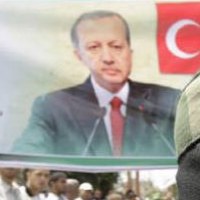
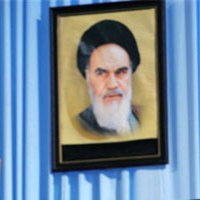
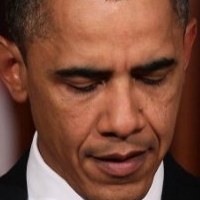
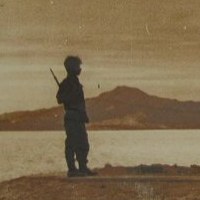




Latest Comments
Hello Mike, Thank you for your positive feedback to the article. I felt there wasn’t too much critical analysis of ...
Thanks for this considered and well constructed article. A follow up article on the manner in which the editorial contro...
THE CLUELESSNESS OF CLAIMING THAT OBAMA'S MIDDLE EAST POLICIES WERE A FAILURE CANNOT BE FURTHER FROM THE TRUTH, WHAT THE...
As long as Obama is the president of the usa do not trust the us government......
Thank you for an good read....